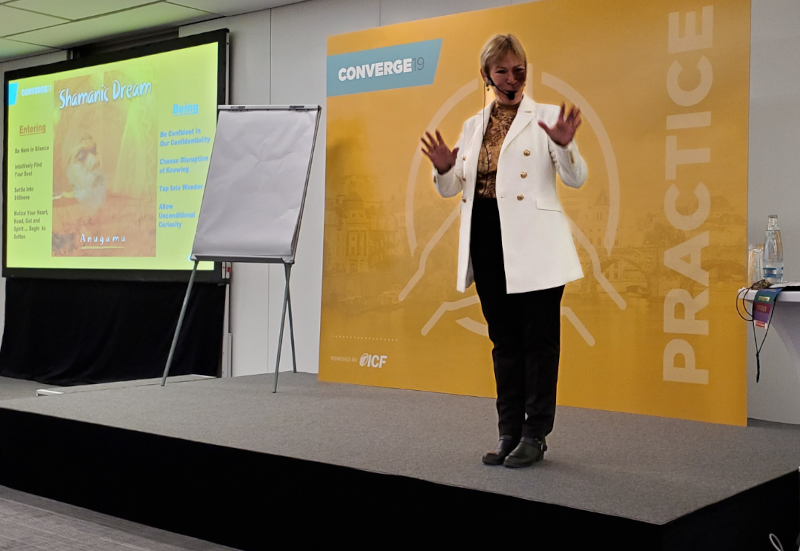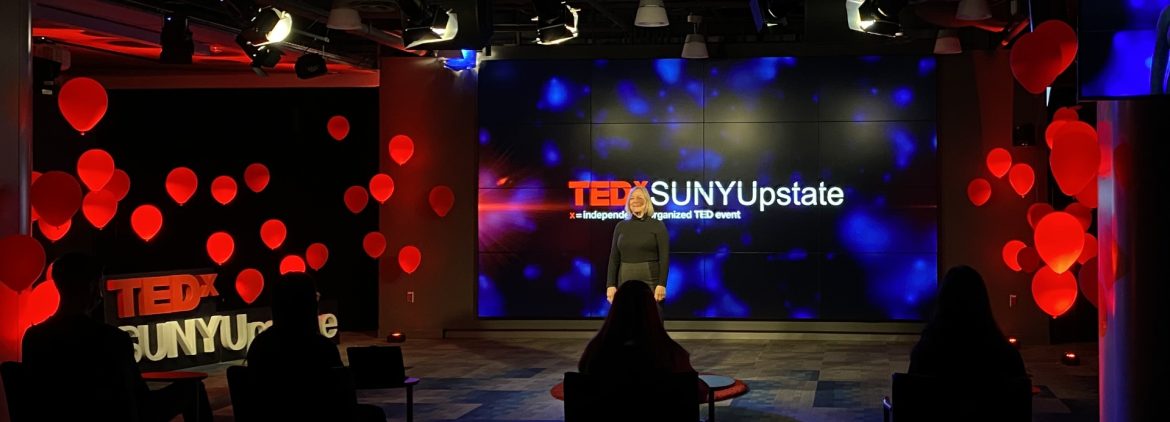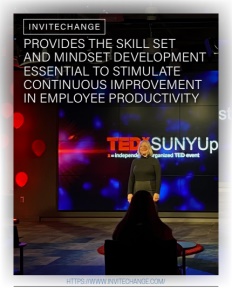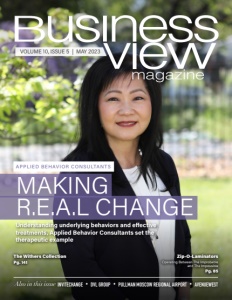inviteCHANGE
provides the skill set and mindset development essential to stimulate continuous improvement in employee productivity
Possessing specialized coaching competence, inviteCHANGE practitioners ensure that enterprise leaders strengthen their capability to meet and exceed financial revenue and income goals and retain their top talent.
When we hear the word coach, most of us picture some type of inspirational and experienced leader exhorting some type of athlete, whether on the ball field, the gridiron, the soccer pitch, or the basketball court, to stick to the game plan, play to one’s strengths, rely on one’s teammates, and push through adversity toward excellence beyond expectations on the road to ultimate victory.
While there are some parallels between that familiar sports scenario and executive leader and team coaching in enterprises, there are some important differences. For example, many different types of specialties are practiced by coaches and their work may be applied in many different arenas for all human endeavors, including leading commercial enterprises, education, healthcare, government services, the fine arts, personal growth and relationships, and parenting, among others.

Janet M. Harvey, CEO
Janet M. Harvey, CEO and President of inviteCHANGE, a coaching and human development organization, has been a leader and innovator in the art and science of coaching for professional development for over 25 years. Her and her team’s experiences with more than 5,000 clients across six continents, her personally spending more than 15,000 hours working with executive leaders and their teams, has informed their cutting-edge approach to how organizations can produce a 10x increase in leader productivity when it engages in what she terms “generative work.”
“About 2012, I initiated some qualitative research with about 250 executive leaders that we were working with at the time,” Harvey recounts.
“That led me to start seeing that there were four common capacities that executive leaders rely upon to succeed – they usually had two of them that were pretty strong. Most are very single-minded and focused on producing results. And to produce them, they were consistently creating something that the market wanted. They were not creating just any good idea, rather using a capacity to create something tangible and pragmatic and get it to market at a price point that made sense to their buyers and delivering that consistently with quality. In this most common scenario, there are two missing capacities: innovation and learning.
“So, it was clear to me that it was important to do something about the ability to originate new thinking – the beginning of the innovation process — and to be a learner in a cycle of experimentation to provide the best possible solution and products. That cycle must be deliberate, focusing on discovering what optimizes a creative idea into something valuable that buyers want and increases market share and competitive position.”
The inviteCHANGE methodology generates sustainable excellence as the outcome. Most enterprises want this outcome and fail to focus on why they want it from a customer experience point of view and what’s required in their daily processes to produce it. A lot of energy goes into thinking about how work gets done and all too often “throwing spaghetti at the wall” becomes too costly. A moment of truth surfaces when they can’t cost-cut their way to growth, let alone distinguish their products and services as a source of long-term value for their customers. What’s most confounding for leaders is that this phenomenon occurs invisibly until leaders change the questions they ask.
For example, instead of asking “why didn’t we sell enough” or “why don’t we have more interested buyers?” or “why aren’t we keeping our best talent?” The questions must shift toward greater examination of what’s motivated all the choices that are generating unsatisfactory results.
Generative curiosity asks questions about the experience of the customer and the employees who serve them, as well as beliefs and values that underpin decision making. Perhaps most valuable are questions for creating awareness that seek out the unexplained inconsistencies and contradictions, that often reveal the seed of new ideas and possibilities. In this latter category, a humble and courageous leader seeks to uncover habits, preferences, assumptions, and biases that block perceiving the ways that the environment and customer desires have shifted, and change has gone unnoticed, resulting in solutions no longer quite fitting the needs.
Key to this generative work, according to Harvey, is a leader’s journey to their “authentic self.” “Not as identified by somebody else, but as identified by the leaders themselves,” she explains. “Who am I? What matters to me? What are my values and principles by which I make decisions? What liberates my own innate creativity?” From this first step of self-awareness, leaders more accurately seek to understand the answers to these same questions of their leaders who they want to be autonomous and fulfilled through their desired creativity and results.
“A generative coaching engagement with an individual or a team is structured, first and foremost, as an awareness activity,” Harvey continues. “’ Do you know who you are and are becoming?’ I know it sounds like a very simple statement, but the question is not answered very well by most people. They know what they do, but they’re less connected in a deliberate way, in a purposeful way, to the reason they work for that organization, the reason they choose to be a leader, the contribution they want to make that’s congruent with their core value system and their guiding principles. And, in many ways, they’ve lost sight of their “why” and how that aligns with the “why” their enterprise exists,” she describes.

“So, this personal reflection could be summarized with the phrase mindset, defined by seven essential elements: frame of reference, attitude, core values, beliefs, guiding principles, habits, and routine actions. Unless invited to consider these elements on purpose, most leaders operate through a mindset that is unconscious. Since a person’s mindset influences how they show up, how they interact and how they make decisions, making that conscious and deliberate decision becomes foundational to invite change and adopt approaches that sustain excellence, no matter the level of complexity or pace of change in their environment.”
“All coaching is learning, growth, and change – all of it. I don’t care what specialty you’re in; you’re helping an individual recognize that they want something different – they want different outcomes, which means there is something internally to shift so they may apply themselves in a new way. I’m not measured by whether my clients produce the outcomes they came to coaching for; I’m measured by whether or not they know how they produced those better and more desirable outcomes. I always expect to leave an engagement with a leader when they recognize they are operating from a healthier mindset than when they came to the coaching and are now able to sustain that excellence when they go. Why? Because in an enterprise, that’s an enduring competitive advantage.”
Nothing in this new paradigm suggests that this journey to self-awareness is an end unto itself — on the contrary. Harvey believes that when a leader does the generative work of revealing, claiming, and operating through their authentic self, they can begin to turn their attention to their employees and truly focus on their needs, goals, desires, personalities, aspirations, etc., in other words – on liberating their workforce members’ full potential, authentically.
Learning to listen into the enterprise at every level becomes a superpower. Leaders can learn to perceive and recognize the patterns that define the unique blend of mindsets and technical acumen which combine to generate their healthy, empowering workplace climate. That formula is exactly what generates a customer experience that competitors cannot replicate because they do not have the same talent and well supported workforce.
You might be thinking as you read, that this makes sense and since it does, how come leaders and teams aren’t doing this already? Thinking gets calcified through history and habit. Human neurobiology prefers habit as a conservation strategy for personal energy. History and a preference for the simplicity of best practices that others pioneer cause leaders to default to what’s familiar and being talked about by other leaders they admire.
‘Following the leader’ cuts off access to personal ingenuity and ignores the constantly shifting context that is unique to their enterprise. “Over time, I have continued to look at this question,” she muses. “‘Why do some leaders and teams have a 10X improvement in productivity and others do not?’ It’s because leaders are not thinking about their relationship with their team in the context of ‘how do I attend to what would make them successful?’ They’re thinking about their own success, or they’re thinking about how to minimize expenses, as opposed to ‘how do I uplift this workforce and what’s asked of me in order to give more opportunity to the competent people that we invested a whole bunch of money recruiting into the organization?’
An important shift in mindset, in this case frame of reference, operates to optimize potential. Instead of telling their teams what to think and do, they invite people to learn how to think in ways that always connect with the core purpose, the vision, and the strategic direction of the organization as the source for choosing among options and gaining certainty about how to produce the outcomes customers and the organization desires. Generative leaders continuously ask themselves, ‘How will I ensure that my actions optimize each person’s strengths and uniqueness on the path to producing results?’ Janet explains that “when leaders invest in their people, that drives revenue growth. It’s not about the cost of the investment; it’s about long-term value creation.”
Harvey insists that the key to changing the mindset of employees is by challenging how they think about productivity and work. What approach they take to the tasks and how they relate to clients and co-workers are the underpinnings. Understanding what is needed to succeed and incorporating new ways of thinking about completing work tasks or navigating the work schedule are the underlying mechanisms that help shift this focus.
Stripping away old ways of thinking, exposing new ways of thinking, and building on this new way of thinking will lead to actions with tangible results. Discovering what each employee can bring to the table and by doing so increasing their confidence in their work performance will lead to tangible results, Harvey argues.
These tangible results bring the natural upswing in overall employee performance and in turn, will increase company productivity in the inviteCHANGE approach to work processes. inviteCHANGE has proven time and time again that they are leaders in this way of approaching work training and employee coaching and represent pioneers in this innovative approach to working relationships and work productivity.
In addition to her duties as inviteCHANGE’s CEO, Harvey is an award-winning author and an in-demand keynote speaker. She is also an active participant in several professional credentialing organizations, such as the International Coaching Federation (ICF) and the Association of Coaching Supervisors (AoCS). “Professional associations provide a structure for people to learn what this professional practice is, and to pledge practice according to a globally recognized set of standards for ethical professionalism. Organizations that seek coaches have learned to select those who have earned credentials because they are more likely satisfied with consistently high-quality outcomes.”
AT A GLANCE
inviteCHANGE
What: Executive coaching specialists focusing on leader productivity improvement – personally, interpersonally, and professionally — for enterprise success.
Where: Freeland, Washington
Website: https://www.invitechange.com/



